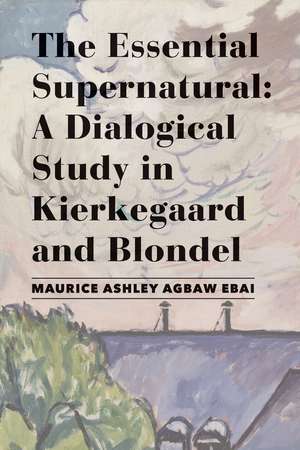The Essential Supernatural: A Dialogical Study in Kierkegaard and Blondel
Autor Maurice Ashley Agbaw-Ebaien Limba Engleză Hardback – 3 mar 2022
Like these philosophers who have preceded him, Agbaw-Ebai exhorts us to never allow the sense of our relation to the supernatural as a settled matter. The philosophy of religion we have inherited does not protect us from having to confront our own subjectivity with autonomy: to be God without God and against God, or to be God with and through God.
Preț: 268.80 lei
Nou
Puncte Express: 403
Preț estimativ în valută:
51.45€ • 53.48$ • 42.62£
51.45€ • 53.48$ • 42.62£
Carte disponibilă
Livrare economică 14-28 ianuarie 25
Livrare express 28 decembrie 24 - 03 ianuarie 25 pentru 41.92 lei
Preluare comenzi: 021 569.72.76
Specificații
ISBN-13: 9781587312403
ISBN-10: 1587312409
Pagini: 400
Dimensiuni: 152 x 229 x 25 mm
Greutate: 0.69 kg
Editura: St. Augustine Press
Colecția St. Augustines Press
ISBN-10: 1587312409
Pagini: 400
Dimensiuni: 152 x 229 x 25 mm
Greutate: 0.69 kg
Editura: St. Augustine Press
Colecția St. Augustines Press
Recenzii
Plato wrote that truth is best seen in dialog, when two minds meet and sparks of truth flame out as from the contact between flint and steel. This is especially true when there are both strong agreements and strong differences between those two minds. This scholarly comparison of Kierkegaard and Blondel fits that model well. The differences are at first stark: Kierkegaard was strongly Protestant, Blondel was strongly Catholic; Kierkegaard focused on choice, Blondel on action; Kierkegaard is usually classified as an "existentialist," Blondel as a "personalist" or a "phenomenologist." What holds them together at their center? Not that both were philosophers, or that both were Christians, or that both happened to be both philosophers and Christians, but that both were Christian philosophers, whose center was Christ, and therefore both God and man, His image.
Fr. Maurice helps us to see how these two very different personal temperaments and philosophical methods meet and see a similar light, not despite their divergence but in and because of it. I found this work surprising and enlightening, and I found Fr. Maurice to be a reliable, sympathetic, and trustable guide through both of these challenging thinkers.
To call a philosopher "challenging" is often a negative euphemism for "difficult to comprehend." But in this case it is not negative but positive. Like Jesus and Socrates, both Kierkegaard and Blondel "challenge" us to a duel--a duel not with them but with some of our easiest and laziest assumptions about the intrinsic dynamism and restlessness of our very selves. This book should come with gentle warning labels to those who dislike that kind of challenge.
— Peter Kreeft, Professor of Philosophy, Boston College
Fr. Maurice helps us to see how these two very different personal temperaments and philosophical methods meet and see a similar light, not despite their divergence but in and because of it. I found this work surprising and enlightening, and I found Fr. Maurice to be a reliable, sympathetic, and trustable guide through both of these challenging thinkers.
To call a philosopher "challenging" is often a negative euphemism for "difficult to comprehend." But in this case it is not negative but positive. Like Jesus and Socrates, both Kierkegaard and Blondel "challenge" us to a duel--a duel not with them but with some of our easiest and laziest assumptions about the intrinsic dynamism and restlessness of our very selves. This book should come with gentle warning labels to those who dislike that kind of challenge.
— Peter Kreeft, Professor of Philosophy, Boston College
Notă biografică
Maurice Ashley Agbaw-Ebai is a priest of the Diocese of Mamfe, Cameroon. He currently teaches courses in Systematic Theology and Philosophy of Religion at Boston College, Newton MA, and St John's Seminary, Brighton MA. He is author of Light of Reason, Light of Faith: Joseph Ratzinger and the German Enlightenment.
